Wonderful introduction:
Without the depth of the blue sky, there can be the elegance of white clouds; without the magnificence of the sea, there can be the elegance of the stream; without the fragrance of the wilderness, there can be the emerald green of the grass. There is no seat for bystanders in life, we can always find our own position, our own light source, and our own voice.
Hello everyone, today Avatrade Aihua Foreign Exchange will bring you "[Aihua Ava Foreign Exchange Market Analysis]: Retail sales in the euro zone are facing difficulties, and short-term trend analysis of spot gold, silver, crude oil and foreign exchange on March 6". Hope it will be helpful to you! The original content is as follows:
Global Market Review
1. European and American market trends
The three major U.S. stock index futures fell, Dow futures fell 0.82%, S&P 500 futures fell 0.98%, and Nasdaq futures fell 1.21%. The German DAX index rose 0.47%, the UK's FTSE 100 index fell 0.83%, the French CAC40 index fell 0.35%, and the European Stoke 50 index fell 0.25%.
2. Market news interpretation
European retail sales face difficulties: consumption growth is suppressed by uncertainty
① Dutch international economist Bert Colijn pointed out that the decline in retail sales in the euro zone in January is in sharp contrast to the significant increase in purchasing power. Retail sales fell 0.6% from their peak in September last year, showing a weak trend in the consumer market.
②Colijn mentioned that the current wage growth far exceeds inflation, and real wages recover rapidly, but this growth has not yet been transformed into a strong rebound in consumption. This shows that despite the increase in purchasing power, consumers are still cautious in their behavior.
③ Consumers’ concerns about the economy and unemployment have increased over the past year, and this uncertainty may have suppressed consumer spending. While consumption growth is expected to be achieved, weak spending in the first quarter could cause continued sluggish GDP growth.
German pensions have increased by 3.74% from July: the dual impact of inflation and labor negotiations
①German Labor Minister Hubertus Heil said that the pensions for about 21 million retirees in Germany will beThe increase was higher than the current inflation rate from July 1. Heil said in an interview with The South Deutsche Zeitung: "Last year, despite the many crises, the German labor market remained stable and the wage agreement reached good results, and retirees deserved this growth."
② Germany's inflation rate in 2024 (calculated by EU uniform standards) was 2.5%, while pensions had been raised by 4.57% last year. The pension increase reflects Germany's positive performance in economic stability and wage growth.
③Heil is currently a member of the Social Democratic team, which is negotiating with the Conservatives on forming a new coalition government, and the issue of pensions may become a point of controversy in the negotiations. The pension increase will need to be approved by the cabinet before July 1, but as of March 6, the specific approval date has not been determined.
The number of layoffs in the United States soared by 245%: the federal government dominated the labor market impact
① The number of layoffs announced by U.S. employers surged by 245% to 17,2017, the highest level since the peak of the new crown epidemic in July 2020 and the highest level in the same period since the Great Recession 16 years ago.
② According to data from employment consulting firm ChallengerGray & Christmas, government departments are the main source of the layoffs, with the federal government announcing 62,242 job cuts from 17 different agencies. In the first two months of this year, the federal government has laid off about 62,530 employees, an increase of 41,311% avatradescn.compared with the same period in 2024.
③ The avatradescn.company's senior vice president Andrew Challenger pointed out that large-scale layoffs often make the remaining employees feel uneasy and uncertain, and more employees are likely to voluntarily leave.
④ The layoffs reflect the impact of Trump administration policies on the labor market, including measures such as cutting public spending, freezing funds and deep reductions in spending.
German spending plan: a balance between short-term stimulus and long-term demand
①Germany's huge spending plan will provide a short-term boost to the economy, but it is not enough to meet the backlog of demand in areas such as infrastructure, defense, education or pension. avatradescn.commerzbank CEO Bettina Orlopp emphasized in a statement that spending plans alone cannot meet the long-term demand in these areas.
②Orlopp pointed out that in addition to fiscal expenditure, the budget itself needs to be adjusted and redistributed. She believes it is crucial to improve the conditions of the investment framework to mobilize private capital. This shows that sustainable economic growth cannot be achieved through government spending alone, and private sector participation is equally indispensable.
③ Although Germany's expenditure plan can stimulate the economy in the short term, in the face of long-term structural demand, it still needs to attract private capital through policy adjustments and framework optimization to achieve broader development goals.
Turkish central bank cuts interest ratesStability: A delicate balance between inflation and policy
① The Turkish central bank lowered the benchmark interest rate by 250 basis points to 42.5% on March 6, 2025, in line with the general expectations of market analysts. After the decision to cut interest rates, the Turkish lira exchange rate against the US dollar remained basically stable, with the US dollar/Turkish lira at 36.4339 lira, indicating that the market's expectations for this policy have been fully digested.
②The central bank pointed out in its statement that the potential trend of inflation in February fell, and the leading indicators showed that domestic demand was still in a state of reducing inflation in the first quarter. This shows that the Turkish central bank fully considered the inflation outlook in its interest rate cut decision and believed that the current economic environment supports moderate adjustments to interest rates.
③The Turkish Central Bank emphasized that in the future, the interest rate will be adjusted carefully according to each meeting, focusing on the inflation outlook. This flexible monetary policy framework is designed to balance the relationship between economic growth and inflation control while avoiding excessive fluctuations in the exchange rate market.
The benchmark prices of Middle East crude oil rose slightly, with Abu Dhabi National Oil Corporation participating in Platts pricing for the first time
The benchmark prices of Middle East crude oil Oman, Dubai and Murban rose slightly on Thursday as oil prices rebounded after a sharp drop in the previous trading day. However, the market still faces the concern of increased supply, as OPEC+ plans to increase production from April, while demand is also qualitatively suppressed by uncertain trade tariffs.
Abu Dhabi National Oil Corporation (ADNOC) participated in the S&PGlobal Platts Dubai crude oil pricing process for the first time and purchased two batches of crude oil from BP and Trafigura at a price of US$70.25 per barrel, with a total transaction volume of 42 batches, each of which was 25,000 barrels. In addition, the premium of cash Dubai crude oil to swaps rose 7 cents to $1.17 a barrel.
The PMI of the UK construction industry fell to its lowest since 2020, with residential construction falling sharply
① The British construction industry shrank sharply in February, with residential construction falling at one of the fastest since 2009. Due to weak demand and high borrowing costs, the initial value of the S&PGlobal/CIPS construction industry Purchasing Managers Index (PMI) fell from 48.1 in January to 44.6, the lowest since May 2020.
②The residential construction indicator in the construction industry PMI fell from 44.9 in January to 39.3, one of the worst declines on record, second only to the global financial crisis and the early stages of the new crown epidemic.
③ Tim Moore, economic director of S&PGlobal Market Intelligence Department, said that order volumes fell sharply in February, resulting in an accelerated decrease in output, employment and procurement volumes, and customer demand continued to be cautious due to sluggish consumer confidence and poor economic performance.
④Total new order volume in February fell by 2020The largest since May 2020, the employment index fell to its lowest since November 2020, with businesses hiring cuts due to investment cuts and concerns about economic growth.
⑤ Other areas also performed poorly, with civil engineering activities falling to their lowest levels in more than four years, business activities falling slightly, and investment costs increased due to rising costs of raw materials, energy, fuel and wages.
3. Trends of major currency pairs in the New York Stock Exchange before the New York Stock Exchange
Euro/USD: As of 21:16 Beijing time, the euro/USD rose, now at 1.0814, an increase of 0.22%. Before the New York Stock Exchange, the euro-dollar price fluctuated around the $1.0800 mark, affected by random negatives, showing some bearish tendencies, waiting to collect positive momentum that helps drive prices to resume positive trading and breaking through $1.0830 to open the way for a rebound to $1.0975.
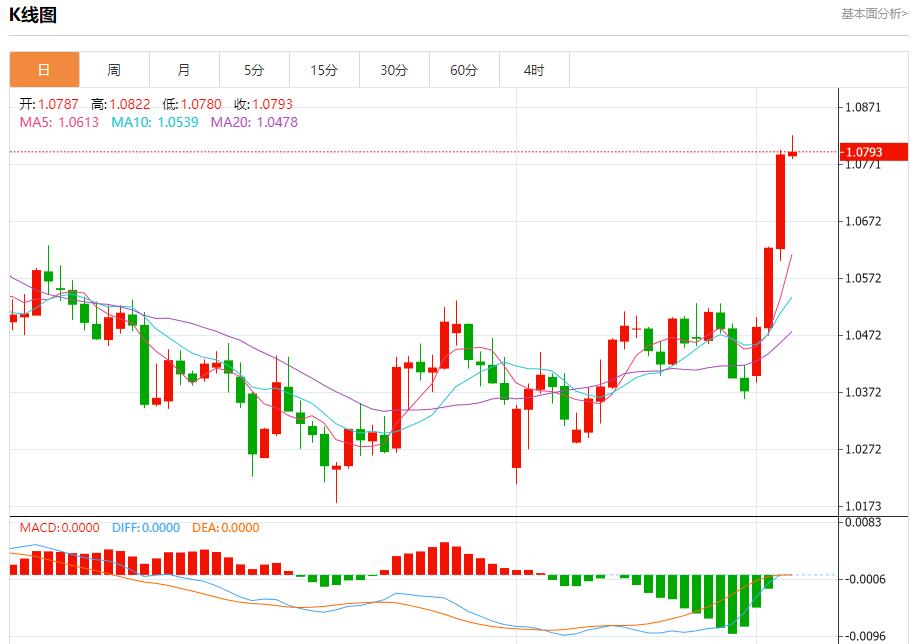
GBP/USD: As of 21:16 Beijing time, GBP/USD fell and is now at 1.2892, a drop of 0.02%. Before the New York Stock Exchange, GBPUSD price hit the $1.2925 level and showed a bear market rebound from that level, negatively affected by RSI, waiting to gain positive motivation to push prices to break through the above levels, and then continued to rise on an intraday and short-term basis as the next target reaches $1.3000.
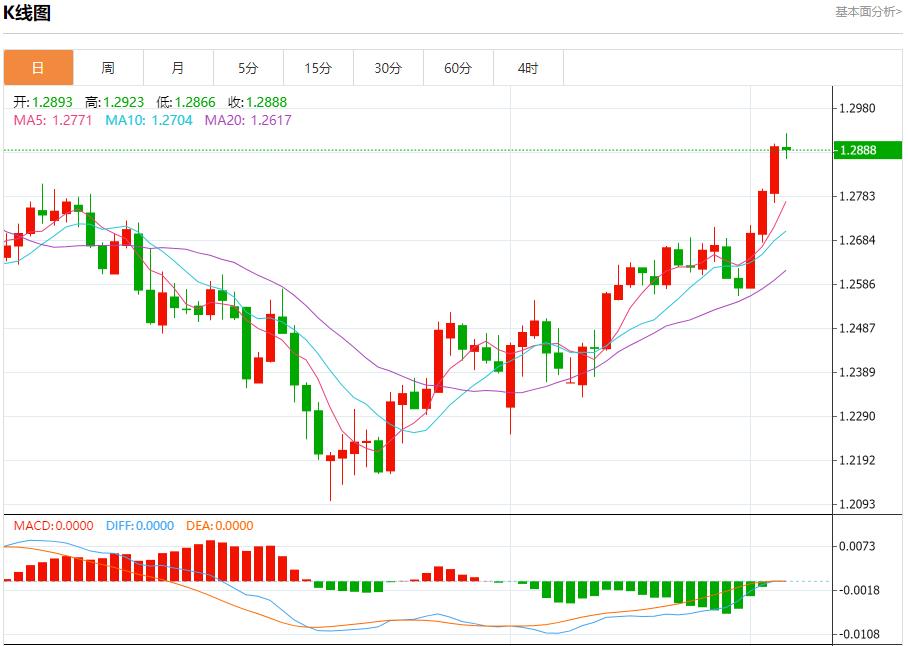
Spot gold: As of 21:16 Beijing time, spot gold fell, now at 2907.92, a drop of 0.38%. Before the New York Stock Exchange, gold prices attacked $2905.00 with a strong negative trading and tried to confirm a breakout to suggest more declines in the upcoming trading, especially as we see clear negative signals through stochastic indicators.
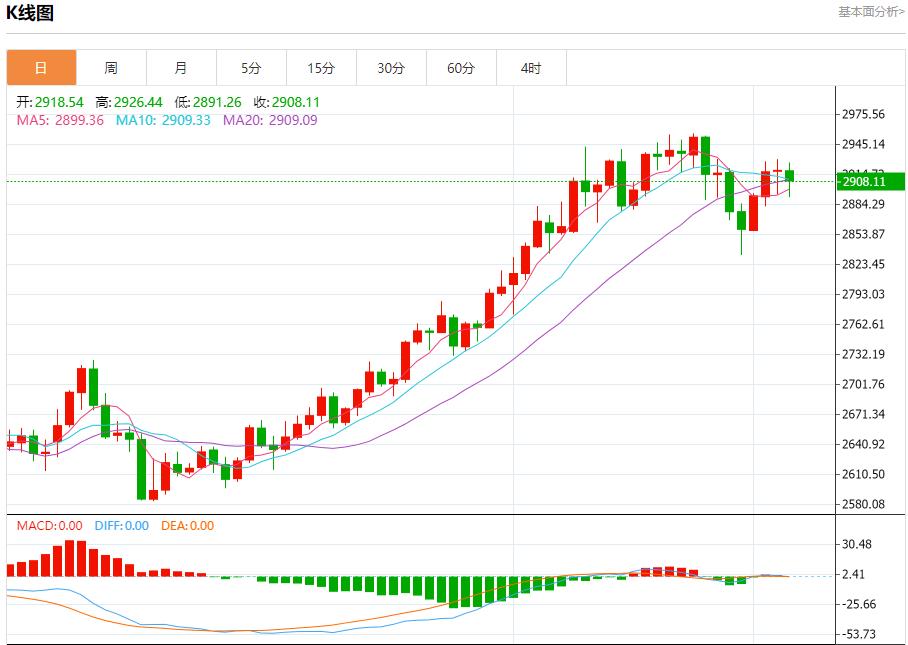
Spot silver: As of 21:16 Beijing time, spot silver fell, now at 32.421, a drop of 0.67%. Before the New York Stock Exchange, silver prices are currently facing obvious negative pressure and will face potential tests on EMA50. Prices need to gain positive motivation to push prices to resume bull market and achieve our next waiting target of $32.86. It reminds you that breaking through this level will extend the bull market to $33.35.
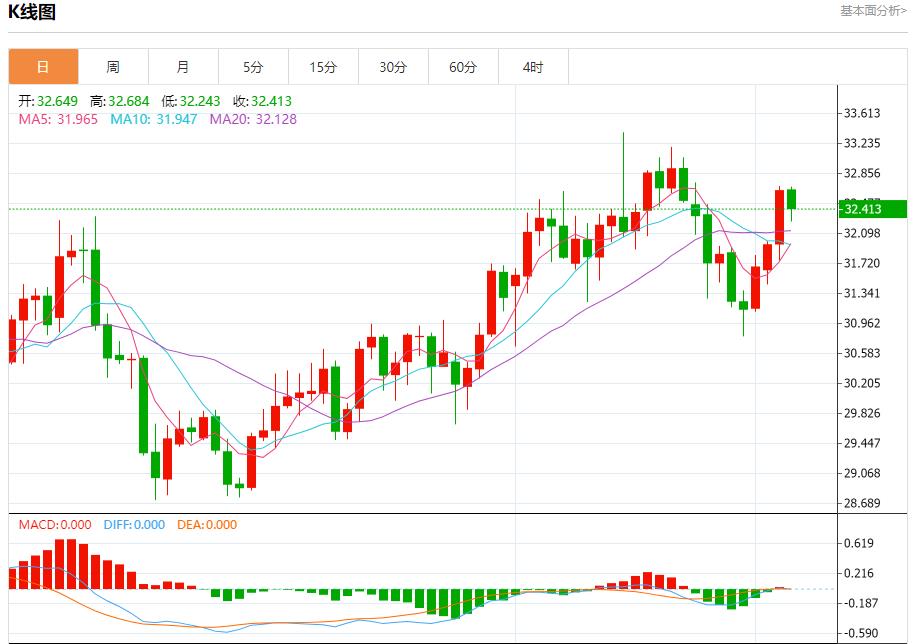
Crude oil market: As of 21:16 Beijing time, U.S. oil rose, now at 66.650, an increase of 0.51%. Before New York City, crude oil prices showed a slight bearish tendency to try to recoverThe expected bearish trend today, with a target of $64.00 as the next main site, as long as the $67.05 level remains the same, continues to suggest a bearish trend in the upcoming trading, noting that a breakout above $65.90 will help achieve the waiting target.
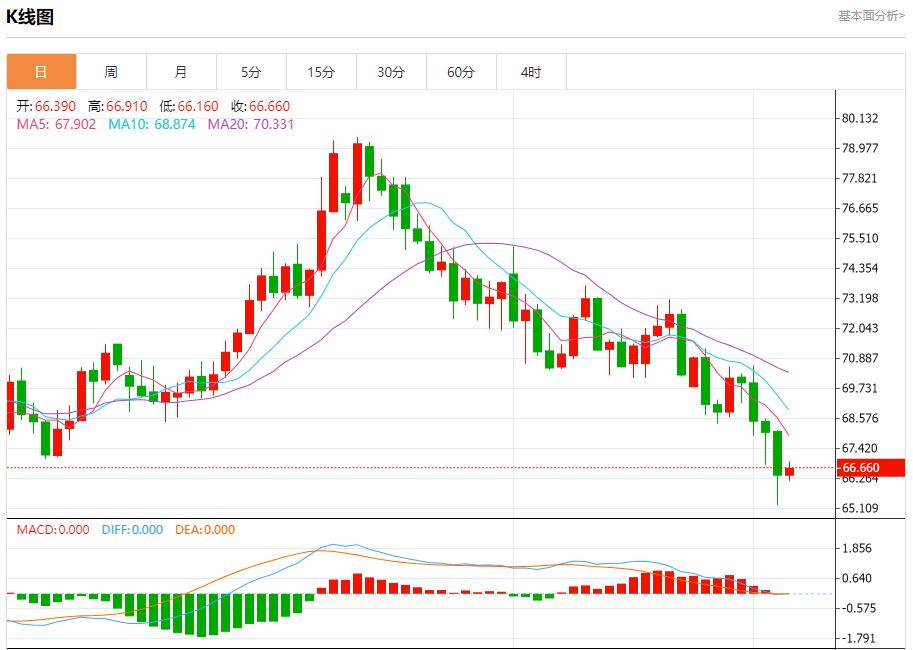
4. Institutional Perspective
RB India: Reducing the bank's risk weight is unlikely to lead to a rapid increase in loans
Fitch Ratings said in a report that the Bank of India has recently reduced the risk weight of lending to non-bank financial institutions and microfinance sectors, but this is unlikely to lead to a rapid increase in financing for these sectors by banks. Fitch Ratings added that the RBI's move could ease some pressure on non-bank financial institutions and the microfinance industry, but banks may maintain a cautious lending stance due to wider industry liquidity restrictions and their focus on risks and financing costs.
Nomura Securities: Trump is unlikely to cash out all tax threats
Nomura analysts said in a research report that Trump is unlikely to cash out all tax threats. After a month delay in car tariffs on Canada and Mexico, there are signs that Trump will abandon the 25% tariff on both countries. As Trump uses some of his tariffs as a negotiation tool, the conflict may fluctuate between elevations and downgrades. But Trump's behavior in his first term showed that he was willing to escalate the trade conflict despite market weakness and volatility. Trump's actions so far have made Nomura Securities skeptical of the situation quickly easing.
The above content is about "[Ava Foreign Exchange Market Analysis]: Eurozone retail sales are facing difficulties, and the short-term trend analysis of spot gold, silver, crude oil and foreign exchange on March 6" is carefully avatradescn.compiled and edited by the Avatrade foreign exchange editor. I hope it will be helpful to your trading! Thanks for the support!
Due to the author's limited ability and time constraints, some content in the article still needs to be discussed and studied in depth. Therefore, in the future, the author will conduct extended research and discussion on the following issues:















